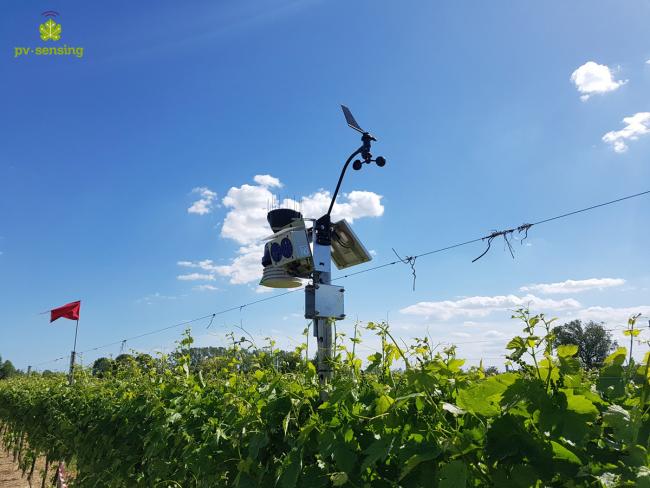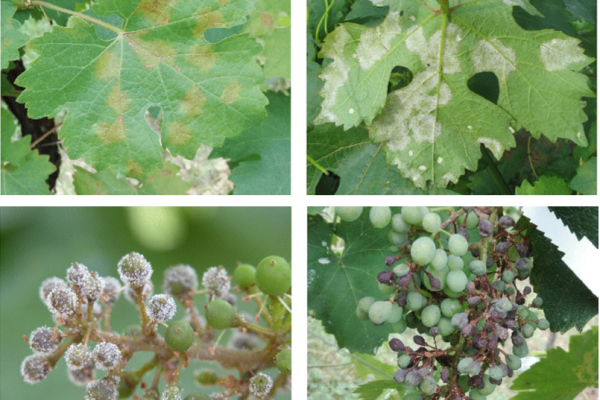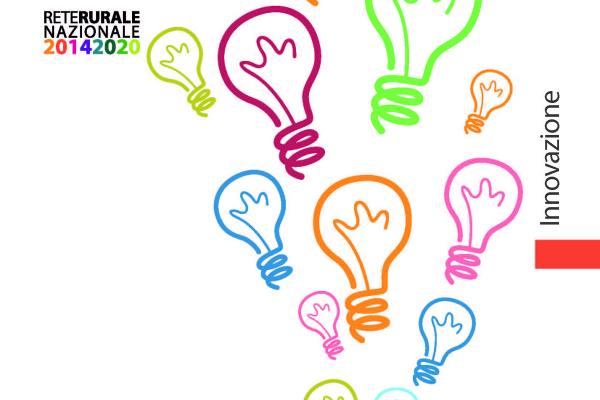PVsensing - Innovative sensors in the vineyard for the prevention of infections by Plasmopara viticola

The objective of the project is the demonstration of the performance of a new system for the prediction and prevention of the infections by Plasmopara viticola. The system comprises innovative sensors in the vineyard and a previsional model integrated in a DSS, which takes the sensors data as an input, giving the infection risk as an output. Thanks to the new sensors, the accuracy is expected to be higher with respect to the existing models, permitting a rationalization of the pesticides use, according to the real necessity of the culture. The system will be tested for 2 years in 11 vineyards, both conventional and organic, with a final analysis of environmental impact and of costs/benefits ratio.
WP1: Deployment and setting of the technical instruments and zero point of testimonial farms;
WP2: Test in 11 different vineyards, 5 conventional and 6 organics, monitoring and measuring the infections by P. viticola (pilot action 1 - 2018)
WP3: Agronomic data analysis, comparison with model predictions, calibration
WP4: Test in 11 different vineyards, 5 conventional and 6 organics, monitoring and measuring the infections by P. viticola (pilot action 2 - 2019)
WP5: Final agronomic data analysis, comparison with the model predictions in the 2 years, measurement of the model previsional accuracy.
WP6: Comparison of agronomic theses, environmental impact and cost-benefit analysis.
Plasmopora viticola is the agent of downy mildew of the grape vine, one of the most dangerous diseases in worldwide viticulture. The prevention of such a disease requires the frequent use of pesticides, which are usually sprayed according to a personal perception of the infection risk, not supported from objective data from the field. The GO PEI PVsensing propose a new system to improve the phytosanitary management of the vineyard against P. viticola, based on the adoption of novel sensors which are collecting climatic and environmental parameters from the fields, some of which have never been directly measured in the field before. Those parameters are the input of a previsional model, which computes the risk of an infection outburst in the crop, potentially with much higher accuracy than the existing systems. The final objective is to guide the farmer with a precise and reliable tool for the optimization of pesticide spraying, performing it more rationally, thus in the number and with the dosages strictly necessary for the protection of the crop, avoiding wastes that are not motivated by a real risk of infections and, on the other side, are polluting the environment.
A total of 11 farms (both conventional and organic) will participate in the field experimentation of the system.
The accuracy enhancement of the system due to the new sensors will be assessed by a detailed agronomic analysis and there will be an evaluation of the environmental impact and the cost-benefit ratio.
| Titolo/Descrizione | Url | Tipologia |
|---|---|---|
|
Project website
|
Sito web
|
|
|
Articolo su Terra e Vita
|
Materiali utili
|
|
|
Pv sensing, dati più precisi contro la peronospora - Video
|
Materiali utili
|
|
|
Nova agricoltura in Vigneto 2019: il futuro è già qui - Video
|
Materiali utili
|
|
|
Articolo su Agricoltori del Veneto
|
Materiali utili
|
|
|
Agronotizie – Fitogest ha pubbicato un articolo dedicato alla viticoltura di precisone e al progetto PVsensing
|
Materiali utili
|
|
|
NUOVA BROCHURE CON DETTAGLI E RISULTATI
|
Materiali utili
|
|
|
Versione inglese della pubblicazione finale di PVsensing.
|
Materiali utili
|
|
|
Programma Convegno finale
|
Materiali utili
|
|
|
Facebook page
|
Link ad altri siti che ospitano informazioni del progetto
|

Sensoristica innovativa nel vigneto per la prevenzione di infezioni da Plasmopara viticola
Il progetto PVsensing si basa sull’utilizzo di sensoristica innovativa che per la prima volta viene sperimentata sul campo. Lo scopo è raccogliere dati utili ad una migliore…
